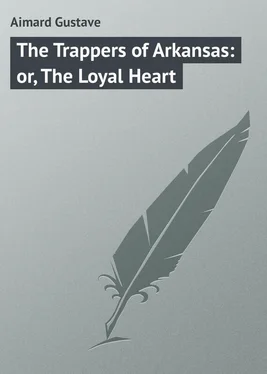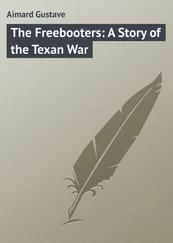Gustave Aimard - The Trappers of Arkansas - or, The Loyal Heart
Здесь есть возможность читать онлайн «Gustave Aimard - The Trappers of Arkansas - or, The Loyal Heart» — ознакомительный отрывок электронной книги совершенно бесплатно, а после прочтения отрывка купить полную версию. В некоторых случаях можно слушать аудио, скачать через торрент в формате fb2 и присутствует краткое содержание. Жанр: foreign_prose, foreign_adventure, на английском языке. Описание произведения, (предисловие) а так же отзывы посетителей доступны на портале библиотеки ЛибКат.
- Название:The Trappers of Arkansas: or, The Loyal Heart
- Автор:
- Жанр:
- Год:неизвестен
- ISBN:нет данных
- Рейтинг книги:3 / 5. Голосов: 1
-
Избранное:Добавить в избранное
- Отзывы:
-
Ваша оценка:
- 60
- 1
- 2
- 3
- 4
- 5
The Trappers of Arkansas: or, The Loyal Heart: краткое содержание, описание и аннотация
Предлагаем к чтению аннотацию, описание, краткое содержание или предисловие (зависит от того, что написал сам автор книги «The Trappers of Arkansas: or, The Loyal Heart»). Если вы не нашли необходимую информацию о книге — напишите в комментариях, мы постараемся отыскать её.
The Trappers of Arkansas: or, The Loyal Heart — читать онлайн ознакомительный отрывок
Ниже представлен текст книги, разбитый по страницам. Система сохранения места последней прочитанной страницы, позволяет с удобством читать онлайн бесплатно книгу «The Trappers of Arkansas: or, The Loyal Heart», без необходимости каждый раз заново искать на чём Вы остановились. Поставьте закладку, и сможете в любой момент перейти на страницу, на которой закончили чтение.
Интервал:
Закладка:
What had passed in that conversation, in which the fate of Don Rafaël was decided, nobody knew – Nô Eusebio no more than the others.
Then, after having conducted Don Inigo to a chamber he had had prepared for him, and having wished him good night, Don Ramón proceeded to rejoin his son, with whom the poor mother was still weeping: without pronouncing a word, he took the boy in his arms, and carried him into his bedroom, where he laid him on the ground near his bed; then the hacendero shut and locked the door, went to bed, with two pistols under his pillow. The night passed away thus, the father and son darting at each other through the darkness the looks of wild beasts, and the poor mother on her knees on the sill of that chamber, which she was forbidden to enter, weeping silently for her first-born, who, as she had a terrible presentiment, was about to be ravished from her for ever.
"Hum!" the mayoral murmured to himself, biting, without thinking of doing so, the end of his extinguished cigarette, "what will be the end of all this? Don Ramón is not a man to pardon, he will not compromise his honour. Will he abandon his son to the hands of justice! Oh no! but, in that case what will he do?"
The worthy mayoral had arrived at this point in his reflections, when Don Inigo Albaceyte and Don Ramón appeared in the patio.
The countenances of the two men were stern; that of the hacendero, in particular, was dark as night.
"Nô Eusebio," Don Ramón said in a sharp tone, "have a horse saddled, and prepare an escort of four men to conduct this cavalier to Hermosillo."
The mayoral bowed respectfully, and immediately gave the necessary orders.
"I thank you a thousand times," continued Don Ramón, addressing the judge; "you have saved the honour of my house."
"Do not be so grateful, señor," Don Inigo replied; "I swear to you that when I left the city yesterday, I had no intention of making myself agreeable to you."
The hacendero only replied by a gesture.
"Put yourself in my place; I am criminal judge above everything; a man is murdered – a worthless fellow, I admit – but a man, although of the worst kind; the assassin is known, he traverses the city at full gallop, in open daylight, in the sight of everybody, with incredible effrontery. What could I do? – set off in pursuit of him. I did not hesitate."
"That is true," Don Ramón murmured, holding down his head.
"And evil have been the consequences to me. The scoundrels who accompanied me abandoned me, like cowards, in the height of the storm, and took shelter I know not where; and then, to crown my troubles, two jaguars, magnificent animals, by the bye, rushed in pursuit of me; they pressed me so hard that I came and fell at your door like a mass. It is true I killed one of them, but the other was very nearly snapping me up, when you came to my assistance. Could I, after that, arrest the son of the man who had saved my life at the peril of his own? That would have been acting with the blackest ingratitude."
"Thanks, once more."
"No thanks; we are quits, that is all. I say nothing of some thousands of piastres you have given me; they will serve to stop the mouths of my lynxes. Only, let me beg of you, Don Ramón, keep a sharp eye upon your son; if he should fall a second time into my hands, I don't know how I could save him."
"Be at ease, in that respect, Don Inigo; my son will never fall into your hands again."
"The hacendero pronounced these words in so solemn and melancholy a tone, that the judge started at hearing them, and turned round saying, —
"Take care what you are about to do!"
"Oh, fear nothing," replied Don Ramón; "only, as I am not willing that my son should mount a scaffold, and drag my name in the mud, I must endeavour to prevent him."
At that moment the horse was led out, and the juez de letras mounted.
"Well, adieu, Don Ramón," he said in an indulgent voice; "be prudent, this young man may still reform; he is hot blooded, that is all."
"Adieu, Don Inigo Albaceyte," the hacendero replied, in so dry a tone that it admitted of no reply.
The judge shook his head, and clapping spurs to his horse, he set off at full trot, followed by his escort, after having made the farmer a farewell gesture.
The latter looked after him, as long as he could see him, and then re-entered the house with long and hasty strides.
"Nô Eusebio," he said to the mayoral, "ring the bell to call together all the peons, as well as the other servants of the hacienda."
The mayoral, after having looked at his master with astonishment, hastened to execute the order he had received.
"What does all this mean?" he said to himself.
At the sound of the bell, the men employed on the farm ran to answer it in haste, not knowing to what cause they should attribute this extraordinary summons.
They were soon all collected together in the great hall, which served as a refectory. The completest silence reigned among them. A secret pang pressed on their hearts, – they had the presentiment of a terrible event.
After a few minutes of expectation, Doña Jesuita entered, surrounded by her children, with the exception of Rafaël, and proceeded to take her place upon a platform, prepared at one end of the hall.
Her countenance was pale, and her eyes proclaimed that she had been weeping.
Don Ramón appeared.
He was clothed in a complete suit of black velvet without lace; a heavy gold chain hung round his neck, a broad leafed hat of black felt, ornamented with an eagle's feather, covered his head, a long sword, with a hilt of polished steel, hung by his side.
His brow was marked with wrinkles, his eyebrows were closely knitted above his black eyes, which appeared to dart lightning.
A shudder of terror pervaded the ranks of the assembly – Don Ramón Garillas had put on the robe of justice.
Justice was then about to be done?
But upon whom?
When Don Ramón had taken his place on the right hand of his wife, he made a sign.
The mayoral went out, and returned a minute after, followed by Rafaël.
The young man was bareheaded, and had his hands tied behind his back.
With his eyes cast down, and a pale face, he placed himself before his father, whom he saluted respectfully.
At the period at which our history passes, in those countries remote from towns and exposed to the continual incursions of the Indians, the heads of families preserved, in all its purity, that patriarchal authority which the efforts of our depraved civilization have a tendency to lessen, and, at length, to destroy. A father was sovereign in his own house, his judgments were without appeal, and executed without murmurs or resistance.
The people of the farm were acquainted with the firm character and implacable will of their master; they knew that he never pardoned, that his honour was dearer to him than life; it was then with a sense of undefinable fear that they prepared to witness the terrible drama which was about to be performed before them between the father and the son.
Don Ramón arose, cast a dark glance round upon the assembly, and threw his hat at his feet:
"Listen all to me," he said in a sharp but most distinct voice; "I am of an old Christian race, whose ancestors have never done wrong; honour has always in my house been considered as the first of earthly goods; that honour which my ancestors transmitted to me intact, and which I have endeavoured to preserve pure, my first-born son, the inheritor of my name, has sullied by an indelible stain. Yesterday, at Hermosillo, in consequence of a tavern quarrel, he set fire to a house, at the risk of burning down the whole city, and when a man endeavoured to prevent his escape, he killed him with a poniard stroke. What can be thought of a boy who, at so tender an age, is endowed with the instincts of a wild beast? Justice must be done, and, by God's help, I will do it severely."
Читать дальшеИнтервал:
Закладка:
Похожие книги на «The Trappers of Arkansas: or, The Loyal Heart»
Представляем Вашему вниманию похожие книги на «The Trappers of Arkansas: or, The Loyal Heart» списком для выбора. Мы отобрали схожую по названию и смыслу литературу в надежде предоставить читателям больше вариантов отыскать новые, интересные, ещё непрочитанные произведения.
Обсуждение, отзывы о книге «The Trappers of Arkansas: or, The Loyal Heart» и просто собственные мнения читателей. Оставьте ваши комментарии, напишите, что Вы думаете о произведении, его смысле или главных героях. Укажите что конкретно понравилось, а что нет, и почему Вы так считаете.












